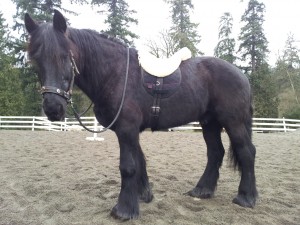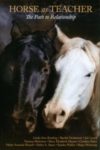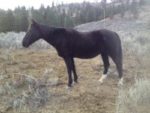Age-Defying Equines – Part 1
by: Marcia King
Click this link for the original article in its entirety: TheHorse.com
 Whether you consider a horse to be old at 18 or 25, at some point, senior horses are going to start showing clinical signs of aging–moving more slowly or stiffly, becoming unthrifty, developing a dull coat, or displaying subtle or obvious signs of a disease process. Here are some of the common problems you could encounter in your aged friend and what you should know about those topics to help him through those golden years.
Whether you consider a horse to be old at 18 or 25, at some point, senior horses are going to start showing clinical signs of aging–moving more slowly or stiffly, becoming unthrifty, developing a dull coat, or displaying subtle or obvious signs of a disease process. Here are some of the common problems you could encounter in your aged friend and what you should know about those topics to help him through those golden years.
In today’s Part 1 we will cover the following topics:
-Cardiac Dysfunction
-Colic
-Compromised Immune Function
——————————————————————–
Cardiac Dysfunction
“Older horses, in general, do not commonly develop life-threatening or career-limiting cardiac problems,” reports Laurie A. Beard, DVM, MS, Dipl. ACVIM, associate clinical professor at Kansas State University’s College of Veterinary Medicine. “Nevertheless, a decrease in aerobic and exercise capacity occurs in older horses. Older horses are not as able to run as fast or as long as younger horses.”
Unfit older horses do not thermoregulate as well as unfit younger horses; thus they can become overheated or chilled more easily. The cause of altered themoregulation is unknown, and it’s also unknown if training helps improve the age-related decline in these values, Beard says.
Although usually of little consequence, older horses commonly develop aortic regurgitation. “This is a result of slow degeneration of the aortic valve, leading to leaking of blood across the valve when it shuts,” Beard explains. “The majority of older horses with aortic regurgitation are clinically normal and do not have exercise intolerance. There is no treatment, as this does not appear to result in any significant problem. The prognosis for older horses with aortic regurgitation is excellent.”
Beard notes that in very rare cases, the volume of regurgitant blood can be large enough to enlarge the chambers of the heart, resulting in heart failure. “If a murmur consistent with aortic regurgitation is noted, a physical examination should be performed every 6-12 months. Enlargement of the heart chambers can lead to congestive heart failure, which has a poor prognosis for life.”
Colic
“Older horses can be more prone to impaction colic,” says Bill Hope, DVM, Dipl. ABVP, associate professor (clinical track, equine ambulatory) at Purdue University. “Their digestive systems don’t adapt as well as younger horses.”
Reduced ability to handle certain types of feed and reduced water consumption in the winter can lead to constipation, then impaction, then colic. Clinical signs include abdominal discomfort or pain (stretching, lying down and rolling, getting up and down, and restlessness).
Treatment depends on the severity of the impaction. “In mild cases, we often administer warm water and mineral oil through a nasal gastric tube to try to loosen up the impaction, or sometimes Epsom salts by stomach tube; it will take about 12 hours or so for the impaction to pass,” says Hope. “We also provide pain relievers to keep the horse from lying down or rolling while this process is going on.”
If that doesn’t work or for more difficult cases, the next step is over-hydrating the horse with IV fluids to try to pull water into the bowel and break down the impaction.
Should that fail, the only option left is surgery. Unfortunately, older horses do not recover as well from colic surgery, although with today’s advanced anesthestic techniques, it is less risky than in the past to put an older horse under general anesthesia.
Recovery from anesthesia can be an issue. “Older horses tend to have brittle bones,” Hope says. “Sometimes when recovering from anesthesia, they can break a leg because they get up too quickly, then fall, put excess strain on a leg, or bend it back in the wrong direction.”
To minimize colic, provide equine senior feeds, which can be more digestible, and encourage water consumption by increasing salt consumption (i.e., add a little salt to the feed, put a salt block beneath the feed in the feed bunk, or provide separate salt blocks). Try to keep drinking water temperate in the winter.
Compromised Immune Function
The field of immunology in older horses is just beginning to be evaluated, says Meri Stratton-Phelps, DVM, MPVM, clinical assistant professor of large animal medicine at the University of Georgia and owner of All Creatures Veterinary Nutrition Consulting Service. “Research performed in humans has demonstrated that the immune systems of elderly people may be disregulated, resulting in an increased incidence of cancer and autoimmune diseases. To date, with the exception of secondary disease processes that occur in older horses, veterinarians have not yet identified a group of diseases that specifically occur in elderly horses due to immune system dysfunction.”
Clinical signs associated with secondary disease processes, i.e., malodorous nasal discharge with tooth root infection, sole abscesses and lameness with Cushing’s disease, weight loss, chronic skin infection, etc., might indicate that an elderly horse has a compromised immune system. Treatment is currently directed at the secondary disorders.
“The prognosis for recovery from disease in an elderly equine patient depends on the inciting cause of the disease, and in the horse’s ability to respond to the medical treatments,” Stratton-Phelps states. “Each case must be evaluated as an individual patient.”
——————————
Next we will cover the following topics:
–Cushing’s Disease
-Degenerative Joint Disease
–Dental Disease


